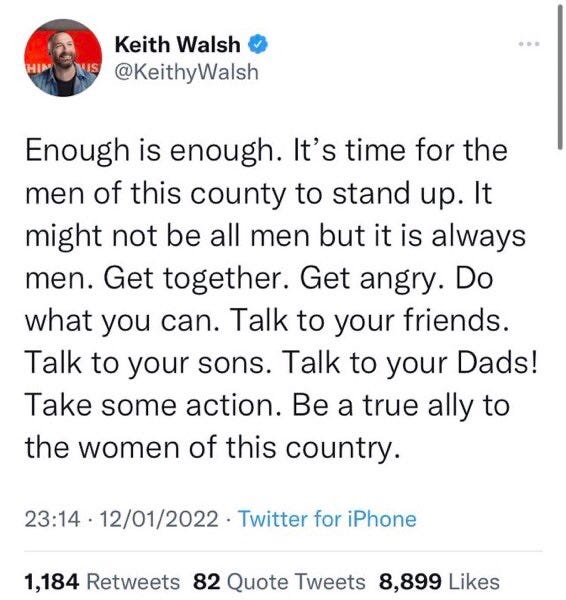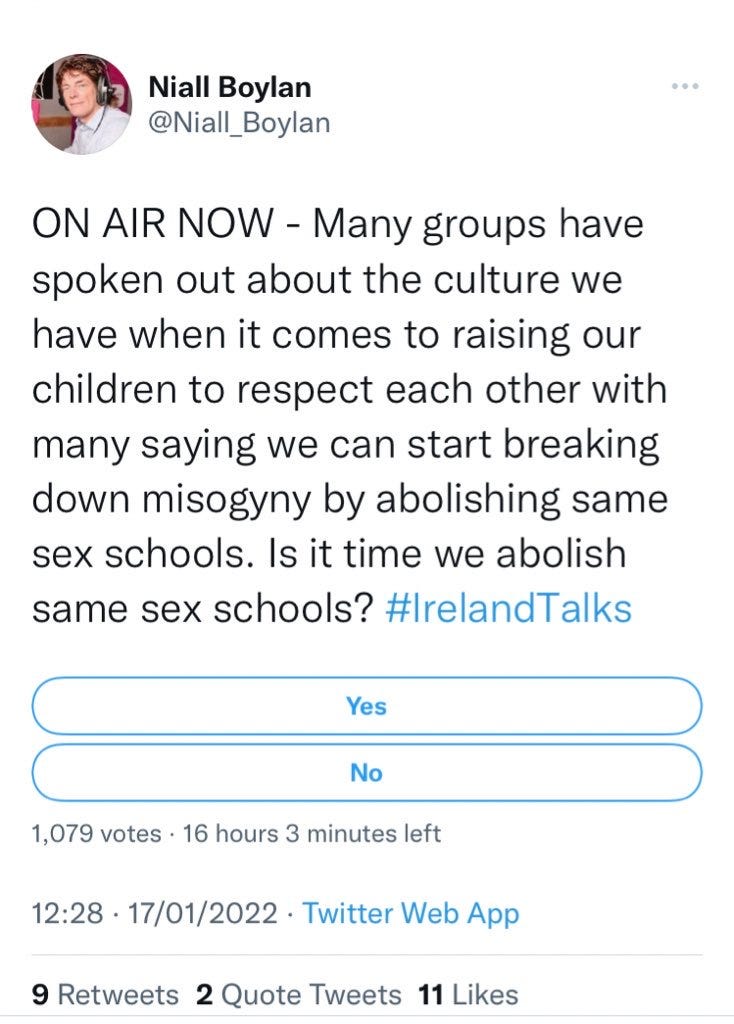"Teach Men Not To...", Revisited
Can targeting small incivilities educate men out of killing?
I’ve titled this ““Teach Men Not To...” Revisited” because it picks up on some of the themes I wrote about on this in the past, here.
The ultimate conclusion of that piece was that certain types of activists seeking to make the world safer for women (they say…) are often cherry-picking bits of what they would usually call Patriarchy, and trying to reintroduce those into society without the supporting norms, or without admitting that’s what they’re doing. In writing about the subject again I’m going to try and be a bit nicer and cover off some aspects I missed.
There was a murder of a young woman in Ireland last week which has convulsed the country, leading to widespread protest, comment and speculation on what can be done to stop such a thing happening again.
I’m not going to link to a story on it because I think there are enough people feeding her life into the take machine. You can find detail on it very easily if you google it. What interests me is the way people react to these events like this; particularly the focus on educating men out of murder.
Let’s steel-man the “Teach Men Not To” argument.
The best case is represented by something like Domestic Violence. It’s less common for a man to hit his wife than it was a hundred years ago, and more common for people to speak up if they hear of that happening. People were educated on it - so some of that change is education, right? I think the answer there is yes and no.
There were educational campaigns, but they were underwritten by the changing status of women in society. Women gained increasing power in the workplace, legal and contractual power, in institutions (including marriage), in politics, economically, so men were forced to change. You’re less likely to dismiss women’s well-being when you’re dependent on women’s spending, or their readership, or their vote, or when your boss is a woman.
If DV declined, and the cultural feeling around it changed, that was caused by women becoming more powerful than they used to be in certain settings, not the other way round.
In changing, women lost as well as gained, but we’ll leave that to one side. We’ll also leave to one side the fact that “ending violence” is an emotional and utopian project rather than a practical one. The scope to further increase the power of women as consumers, in cultural institutions, in working life, in a way that would lead to an end to all violence against seems pretty limited.
Drink-driving is another good example where education obviously had an effect in changing undesirable behaviour. Again, I don’t think it’s a good comparator. In that case there was little difference between what you were educating about and what you were looking to change. Teaching people not to drink-drive will result in fewer drink-driving deaths.
There’s an assumption that bad male behaviour exists on a continuum with each point leading naturally into the next. In this understanding, (say) talking over a woman in a work meeting is the embryonic form of the behaviour that leads men to murder women. Stating it that plainly reveals how absurd it is; I don’t believe that is a charicature of how activists and commentators talk about the subject. It’s not obviously the case that encouraging men to be more respectful of women in small daily interactions with them will result in fewer people being murdered.
Increasing the level of civility towards women, or in public life generally, is worth doing for it’s own sake. Maybe it can be changed through education, though I’m skeptical, for reasons outlined in my other piece. But it would have no downstream impact on murder. Replicating other educational campaigns would mean getting the murderers, or nearly-murderers, in a class-room and telling them not to murder anyone. I’d love to read a study on the efficacy of this kind of approach.
I agree with anyone who is repulsed by the murder of a vital young person, and who wants to commemorate their death; or who thinks, “we shouldn’t have to put up with this; it could have been me or someone I love; what can we do”. I feel the same.
There are lots of things that we can do that most people of most political orientations would support. Off the top of my head that would include more police on the street, making it easier for women to legally defend themselves, increased penalties for violence against women and for sexual violence, laws against extreme pornography, and increased direct material assistance for women experiencing or in danger of domestic violence.
I think many people would also support the creation of women only spaces - though it’s not clear how such a thing would be possible in Ireland, given our current ID laws.
You could probably come up with half a dozen other ideas that would be both possible, popular with everyone and that might make a difference to women’s safety. The drawback from an activist point of view is that these would be practical ideas, rather than open-ended utopian ones, and they may provide little opportunity to continuously expand the reach and scale of your activism into every area of human consciousness. Sorry about that! I’m sure we’ll all cope.






Good piece. A nation of hysterics. Take away the Church and the hysteria has infected into everything. Perfect timing for the hysteria to be released, - pent up over Xmas, people's brains destroyed by social media, impact of covid restrictions etc. It's Savita 2.0.
Girls do better in same sex schools, the demand to abolish them is nothing to do with "ending male violence", but everything to do with destroying what is left of the education system. What kind of school did the two boys who killed Ana Kriegel go to? Nobody seems remotely interested in knowing the answer.
I've seen this as a media led spectacle, of an innocent young Irish woman, a murder mystery, a national mass formation, and it inevitably being co-opted by the left liberal talking heads.
But ultimately all led by the media.
This will be forgotten about when it exhausts its utility to the news cycle. Who's talking about Sarah Everett in the UK media these days?
It really does seem that the pandemic response has trained a lot of people very well to respond as a mass to whatever narrative the media uniformly create.
This isn't said out of indifference to the crime. I hope swift justice is administered to whoever did it.